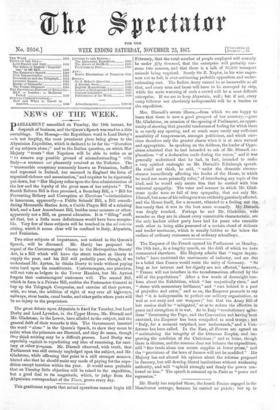Mrs. Disraeli's severe illness,—from which we are happy to learn
that there is now a good prospect of her recovery,—gave Mr. Gladstone, on occasion of the opening of Parliament, an oppor- tunity of showing that graceful tenderness of feeling for which there is so rarely any opening, and so much more rarely any sufficient sensibility of temperament, amongst politicians, and which exer- cises therefore only the greater charm when it is at once natural and appropriate. In speaking on the Address, the leader of Oppo- sition admitted that he had intended to ask of Mr. Disraeli ex- planations "of a declaration made during the recess," and it was generally understood that he had, in fact, intended to make a very spirited onslaught on Mr. Disraeli's Edinburgh speech. He could not think, he said, " under the domestic circum- stances immediately affecting the leader of the House, to which he need not more pointedly refer," of introducing any topic of the kind, and he would only assure him that he carried with him universal sympathy. The voice and manner in which Mr. Glad- stone spoke were so full of true sympathy, that not only Mr. Disraeli, but some of his colleagues were evidently genuinelyaffected , and the House itself, for a moment, vibrated to a feeling not the less manly that it was in the beat sense womanly. Mr. Disraeli was deeply touched. Perhaps he and Mr. Gladsbine, wide asunder as they are in almost every conceivable characteristic, are the only leaders either party have had for years who resemble each other in being alike possessed of a certain chord of delicate and tender sentiment, which is usually hidden as far below the surface of ordinary statesmen as of ordinary schoolboys.,


































